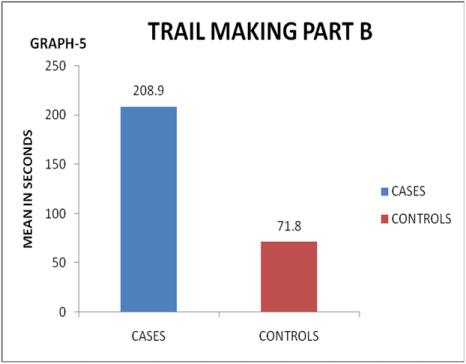
A Correlation between Neuropsychological Tests and Indirect Markers of Alcoholism in Alcohol Dependence
Abstract
Background: Alcohol dependence is an increasing burden to the society. Cognitive impairment occurs in alcohol dependence. The indirect markers of alcoholism ALT, AST and GGT levels are elevated in alcohol dependence. There is poor performance observed in neuropsychological tests in alcohol dependence individuals. Objectives: To correlate the results of the neuropsychological tests - trail making A and B with indirect markers of alcohol use - serum ALT, AST and GGT. Materials and Methods: Total of 60 people participated in the study, 30 persons satisfying ICD 10 criteria for alcohol dependence were taken as study group and 30 non-alcohol dependent healthy volunteers were taken as controls. Trail making A and B were administered and the serum levels of ALT, AST, GGT were estimated in both groups. Results: The time taken to complete the trail making A and B and the serum levels of ALT, AST,GGT were statistically analysed using unpaired ‘t’ test and Pearson’s rank correlation in both the study and control groups. The neuropsychological performance was better in the control group than the study group. Only serum GGT levels significantly correlated with the neuropsychological tests in the positive direction. Conclusion: There is evidence of cognitive impairment in alcohol dependence and serum GGT can be used as a cognitive marker for it.
Full Text:
PDFReferences
World Health Organisation- Global Health Observatory Data.
The ICD-10 Classification of Mental and Behavioural Disorders
Neisser, U. (1967) Cognitive Psychology. Englewood Cliffs, NJ: Prentice-Hall.
Brandimonte MA, Bruno N, Collina S. Psychological concepts: An international Historical Perspective. Hove, UK:Psychology Press, 2006.
Nowakowska K, Jablkowska K, Borokowska A. Cognitive dysfunctions in patients with alcohol dependence- Archives of psychiatry and psychotherapy,2008;3:29-35.
Staples MC. Mandyam CD frontiers of psychiatry review published: 30 September 2016 doi: 10.3389/ fpsyt.2016.00162.
Parsons OA. Neurocognitive deficits in alcoholics and social drinkers: A continuum? Alcohol Clin Exp Res. 1998, 22: 954–961.
Bechara A, Dolan S, Denburg N, Hindes A, Anderson SW, Nathan PE. Decision- making deficits, linked to a dysfunctional ventromedial prefrontal cortex, revealed in alcohol andstimulant abusers. Neuropsychologia 2001, 39:376–389.
Noel X, Sferrazza R, Linden M, Paternot J, Verhas M, Hanak C, Pelc I, Verbanck P. Contribution of frontal cerebral blood flow measured by 99mTcbicisate SPECT and executive function deficits to predicting treatment outcome in alcohol-dependent patients. Alcohol 2002, 37: 347–54.
Cunha PJ, Novaes MA. Neurocognitive assessment in alcohol abuse and dependence: implications for treatment, Rev Bras Psiquiatr. 2004, 26: 23–27.
Rosenbloom MJ, O’Reilly A, Sassoon SA, Sullivan EV, Pfefferbaum A. Persistent cognitive deficits in community-treated alcoholic men and women volunteering for research: limited contribution from psychiatric comorbidity. Stud Alcohol 2005, 66: 254–265.
Allen JP, Sillanaukee P, Strid N. Biomarkers of heavy drinking National institute on alcohol abuse and alcoholism journal- publication – pubmed
Hashimoto E, Riederer P, Hesselbrock VM, Hesselbrock MN, Mann K. Consensus paper of the WFSBP task force on biological markers: biological markers of alcoholism- the world journal of biological psychiatry, 2013; 14: 549-564
Sharpe PC Mc Bride R, Archbold GPR. Biochemical markers of alcohol abuse – QJ Med 1996; 89:137-144.
Kalapatapu RK, Chambers R. Novel objective biomarkers of alcohol use: potential diagnostic and treatment management tools in dual diagnosis care. J Dual Diagn. 2009 January 1; 5(1): 57–82.
Kalapatapu RK, Delucchi KL. Lasher BA, Vinogradov S, Batki SL. Alcohol Use Biomarkers Predicting Cognitive Performance: A Secondary Analysis in Veterans With Alcohol Dependence and Posttraumatic Stress Disorder. Mil Med. 2013 September; 178(9):. doi:10.7205/MILMED-D-13-00097.
Irwin M, Smith TL, Butters N, et al. Graded neuropsychological impairment and elevated gamma glutamyltransferase in chronic alcoholic men. Alcohol Clin Exp Res. 1989; 13(1):99–103.
de Bruin EA, Lemmens PH, Hulshoff Pol HE, Verbaten MN, Kenemans JL. Relationship between carbohydratedeficient transfer in, gamma-glutamyltransferase, and mean corpuscular volume levels and alcohol-related brain volume decreases in male drinkers. Hum Psychopharmacol. 2012;27 (6):559–65. [PubMed: 23027680]
Chen CH, Walker J, Momenan R, Rawlings R, Heilig M, Hommer DW. Relationship between liver function and brain shrinkage in patients with alcohol dependence. Alcohol Clin Exp Res. 2012;36(4):625–32. [PubMed: 21995416]
Yavuz BB, Yavuz B, Halil M, et al. Serum elevated gamma glutamyl-transferase levels may be a marker for oxidative stress in Alzheimer’s disease. Int Psychogeriatr. 2008; 20(4):815–23.[PubMed: 18416873]
Refbacks
- There are currently no refbacks.

This work is licensed under a Creative Commons Attribution-NoDerivatives 4.0 International License.
An initiative of The Tamil Nadu Dr M.G.R. Medical University